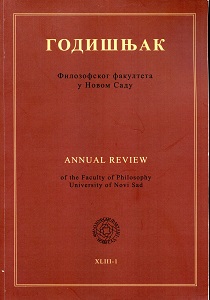KONDICIONALNE KONSTRUKCIJE S VEZNIKOM AKO I GLAGOLOM HTETI U PROTAZI
CONDITIONAL CONSTRUCTIONS WITH CONJUNCTION AKO AND VERB HTETI IN PROTASIS
Author(s): Dušanka Zvekić DušanovićSubject(s): Language studies, Language and Literature Studies, South Slavic Languages
Published by: Филозофски факултет, Универзитет у Новом Саду
Keywords: the Serbian language; conditional constructions; conditional clauses; conjuction ako; modality; modal verbs
Summary/Abstract: The paper analyses conditional sentences with the conjunction ako in which a complex predicate with the modal verb hteti appears as the predicate of the protasis. In such sentences, the apodotic predicate is often modally marked, and it contains modal constructions, which: 1) describe an action one must or should perform before they perform a desired one, or 2) express the possibility of carrying out the desired situations. The means for expressing these apodotic predicates can be typical representatives of the meaning of necessity (the verb morati: ako hoće X, mora Y) and possibility (the verb moći: ako hoće X, može X). The language units expressing the stimuli of different strengths and types include the modal verbs morati, trebati and valjati; predicates with lexical units containing the semantics of requisiteness, necessity, need, etc.; and imperative and modally used present and future tenses. The negative verbs trebati, moći and smeti; lexical instruments; and negative imperative carry the meaning of forbidding, which means a stimulus not to carry out the named action. Within the meaning of the possibility, the following subtypes can be isolated: permission for the subject to carry out a desired situation, a subject's ability to carry out the situation, and a speaker's readiness to satisfy the wish of the protatic predicate’s subject. The most frequent apodotic modal ability indicators are the modal verbs moći and smeti, the imperative, da + present tense, future I, and various lexical instruments.
Journal: Годишњак Филозофског факултета у Новом Саду
- Issue Year: 43/2018
- Issue No: 1
- Page Range: 453-466
- Page Count: 16
- Language: Serbian

